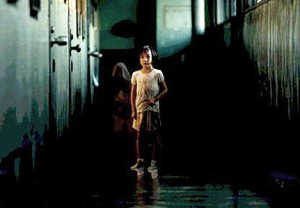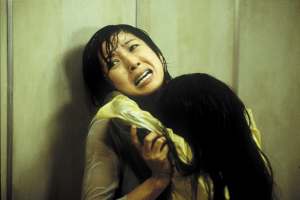Dark Water
 Hideo Nakata (Ringu, Chaos) is an extremely talented director, who thrives on creating dread inducing atmosphere out of simple elements. And when he is working on the mystery rather than the revelation of the story, the movie works very well. Nakata clearly storyboards all of his shots in advance, each frame seems to be taken out of a graphic novel, and when he is in complete control, letting the audience in with new details bit by bit, while simultaneously tantalizing and teasing us by throwing in creepy elements that haven’t received an explanation, he is amazing. The use of sound, especially the music, is superb. The stationary camera is enormously effective. Nakata has a way of lingering on a shot a little too long, usually while the characters do not move or say anything, increasing the creepy effect of the situation. He uses striking imagery, especially with the use of the watermarks in the ceiling, and an enormous (and enormously earned) scare, late in the film. The dirty look of the home and the dark corners that seem to penetrate each frame, the dingy colors, are infectious to the overall design of the movie, which only makes it more unsettling.
Hideo Nakata (Ringu, Chaos) is an extremely talented director, who thrives on creating dread inducing atmosphere out of simple elements. And when he is working on the mystery rather than the revelation of the story, the movie works very well. Nakata clearly storyboards all of his shots in advance, each frame seems to be taken out of a graphic novel, and when he is in complete control, letting the audience in with new details bit by bit, while simultaneously tantalizing and teasing us by throwing in creepy elements that haven’t received an explanation, he is amazing. The use of sound, especially the music, is superb. The stationary camera is enormously effective. Nakata has a way of lingering on a shot a little too long, usually while the characters do not move or say anything, increasing the creepy effect of the situation. He uses striking imagery, especially with the use of the watermarks in the ceiling, and an enormous (and enormously earned) scare, late in the film. The dirty look of the home and the dark corners that seem to penetrate each frame, the dingy colors, are infectious to the overall design of the movie, which only makes it more unsettling.
But the last 15 minutes, which play like a concession to someone, I’m not sure who, defeat the entire movie.
Spoilers below******
If the movie is supposed to play on a realistic level, what is the explanation of where the mother went? Why is there no thought of ever looking for her? If it is fantasy, what is the hold that the water tower has over everyone? If the building has been abandoned for 10 years, why is the inside of the apartment exactly the same, in terms of its condition? Since the lost little girl keeps making appearances over and over without physical or metaphysical explanation, is she only there to represent the mother’s lost childhood as well, which was noted by the aunt in an earlier scene? The last 15 minutes do nothing with the story and leave everything unexplained on all levels. They gave me more questions and more frustration that Nakata didn’t finish his story outline. I also noticed that these were the first scenes in which Nakata used handheld cameras, and that just reinforces his lack of control.
Spoilers Over******
 I would suggest that Nakata work with another driector similarly to the way that Jeuent and Caro did on Delicatessen and The City of Lost Children, where one worked on the images and the other worked with the actors and the dialogue. The story seemed realistic, but the acting was shrill and and forced by the mother, and everyone else was a cypher. Only the little girl stood out for her naturalness. If Nakata can make a movie this creepy with a half thought out story (and I feel similarly about The Ring, brilliant first 1/2 before petering out once the explanation sets in), imagine if someone else can sort out the details for him and he can concentrate on the misc-en-scene.
I would suggest that Nakata work with another driector similarly to the way that Jeuent and Caro did on Delicatessen and The City of Lost Children, where one worked on the images and the other worked with the actors and the dialogue. The story seemed realistic, but the acting was shrill and and forced by the mother, and everyone else was a cypher. Only the little girl stood out for her naturalness. If Nakata can make a movie this creepy with a half thought out story (and I feel similarly about The Ring, brilliant first 1/2 before petering out once the explanation sets in), imagine if someone else can sort out the details for him and he can concentrate on the misc-en-scene.



